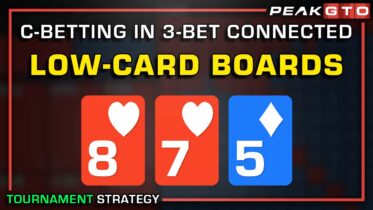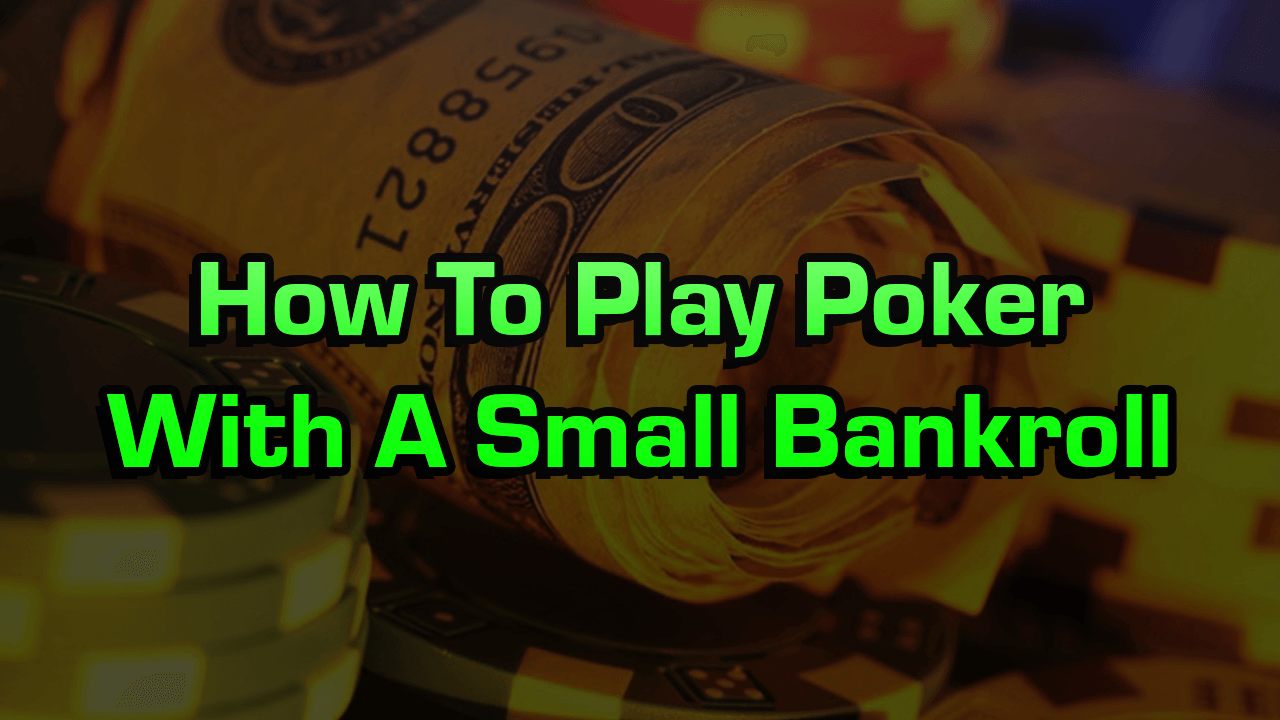Even legends of the game like Phil Hellmuth, Phil Ivey, and Doyle Brunson had to start somewhere. If you are a beginner who is just now learning how to play poker, these five poker tips will set you apart from the other newbies at the table. Poker can be an unforgiving game, but if you are strategically and mentally prepared you will go far on the felt.
Poker Tip #1: Approach Luck Like A Pro
It is important to recognize the variance that comes with poker. A lot of poker players think that every trip to the casino will result in profit, but that is simply not the case! No matter how good you are, you are going to go on big upswings as well as big downswings throughout your poker career. Whether your money line is in the green or in the red, it is important that you make good decisions at the poker table. You must avoid the mindset of “finishing with a profit” or “winning the hand” as such an approach will not result in the best-executed strategy. If you wanted to guarantee you’d win almost every hand, why not just go all-in and scoop the blinds every time? Any rational poker player can recognize the flaw in this logic, although an extreme example, it represents the pitfalls of not approaching the game the right way.
Your goal should be to make the best decision in each spot you encounter, while the cards may not fall your way sometimes, over the long run maintaining the right decisions will produce profit long term.
Even world-class poker players experience significant downswings, and if you are a true beginner who has just learned the rules of Texas Hold’em, you are even more likely to experience the negative sides of variance. The best thing you can do before committing yourself to poker is to recognize there will be extended periods where you will lose, if you are willing to maintain mental toughness and not let the losses impact your decision-making, you will make it out the other end with more money than you started with.
Avoiding An Unprofitable Mindset
Some players, even experienced ones, talk about waiting for “a rush of cards” where they win a hand or two and decide they are going to start playing every hand. Just because they won two hands in a row, they think that they are on some kind of streak with the deck on their side. Other players will cite patterns occurring at the poker table and will let them influence their decisions. They will see tens hit the table in three straight hands and exclaim “tens are hot” and insist on playing any hand containing a ten. Obviously, this logic is flawed and should be avoided in the poker room, as a deck of cards has no memory!
“You will show your poker greatness by the hands you fold, not the hands you play.”
– Dan Reed
Poker Tip #2: Get Rid Of Your Ego
When arriving at the casino, it is important you leave your ego with security at the door. Many poker players get it in their head that they are a “table bully” and utilize too much aggression at the poker table, or they sit next to a table bully and want to “teach that player a lesson” by going after them. If you are being dealt nothing but 7-2 offsuit, the whole concept of going after these players sounds silly, doesn’t it?
The only thing you have control over is what you do with the cards you are dealt, not what cards you are dealt. All you can do at the poker table is make the best decision possible at all decision points. Realize that just because someone is being aggressive and talkative, it doesn’t mean it is your job to go after them.
When encountering a table bully, ask yourself: “what does this player do incorrectly that I can take advantage of?” If a player is raising way too many hands before the flop, call and reraise with a wider range! If a player is way too aggressive and blasting off their entire stack on every river, call wide, make top pair, and call them down! Yes, they may beat you some of the time, but if you correctly exploit maniacs you will profit in the long run. Stay out of ego wars where you start playing garbage hands against opponents for no good reason, ignore the noise and focus on making the best decisions possible in each spot.
You Aren’t Phil Hellmuth
While it is important to not let maniacs at the table stand in the way of your success, it is just as important to not let success get to your head! Many poker players will start studious but once they go on a profitable run, they start thinking they are the best in the world. What happens when you get complacent and oversell your skills? You stop studying, you move up stakes too quickly, and inevitably go broke due to your hubris. Realize that the best poker players never stop studying, and the higher stakes you climb the additional study time you must put in. The higher the stakes, the better the players, it really is that simple. Stay humble, never stop studying, and you will be well on your way to profitable poker.
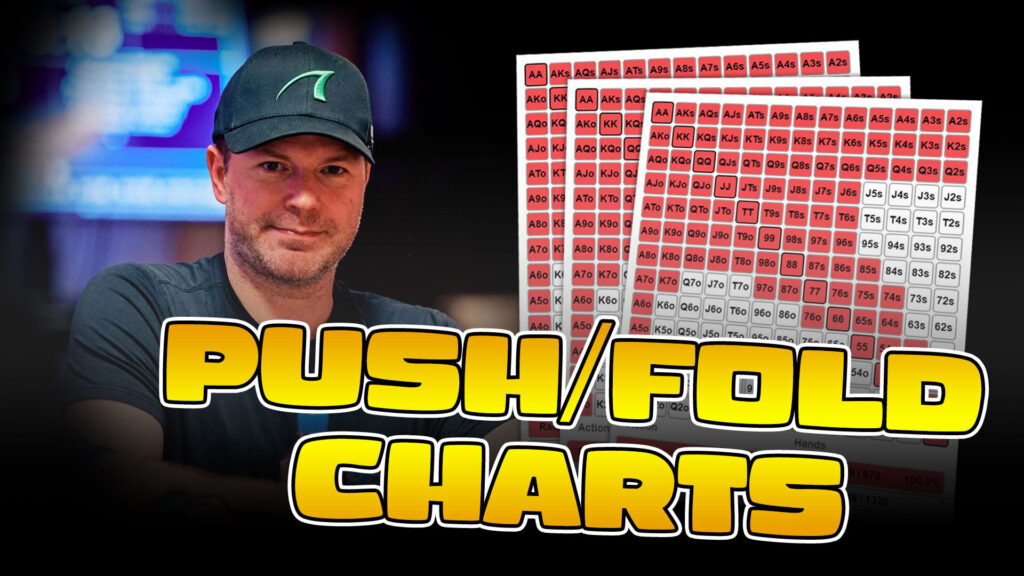
Make the best preflop decisions with Jonathan Little’s Push/Fold Charts!
Poker Tip #3: Position In Poker Is Everything
Understanding the significance of position is just as important as knowing the poker hand rankings. The main benefit of having position on your opponents is that it gives you information that helps you make the best decisions. If you are fortunate to act last within a poker hand, you get to see what all of the other players do first before you decide what play to make. Imagine you were playing Rock, Paper, Scissors and your opponent had to pick first before you made your selection. Unless you were throwing, you would win every time!
Let’s say on the river, heads-up, you are out of position and have to act first prior to your opponent. You have top pair with a marginal kicker, and while you don’t want to put a lot of money into the pot, you know you want to at least put in a little. You make a small bet, but then your opponent raises, brutal!
Now let’s say you decide to check your top pair instead, well, if your opponent elects to check as well you may feel like you missed out on some value! Do you see how your opponent has a significant advantage in getting to act after you? That is called position.
Positional Advantage and Pot Control
The size of the pot is often decided by the player who has position. In no-limit Texas Hold’em, the pot has a tendency to grow exponentially throughout the course of a hand. When players are deciding how much to bet, it is often in relation to the size of the pot. By acting last, the in-position player has the ability to control the size of the pot by being able to close the action within any given betting round.
The Direction Poker Chips Flow
At the poker table, action always moves to the left when dictating turn order, which naturally means chips and money at the table flows to the left. The player on your left will always have position on you, as will the player on their left, the player on that person’s left, and so on. Some poker players get easily frustrated at the player to their left when they continue to win pots against them, but such players fail to realize that is all part of the game.
How To Gain Position On Opponents
Although the structure of Texas Hold’em leaves some factors out of your control, there are ways you can gain positional advantage over your opponents. One such strategy is playing a tight range in early positions, and a loose range in later ones. If you examine the Game Theory Optimal (GTO) charts below, you’ll see that the button (dealer) gets to raise a lot more hands preflop than the under-the-gun (UTG) player who always has to act first.
UTG Raise With 60 Big Blinds
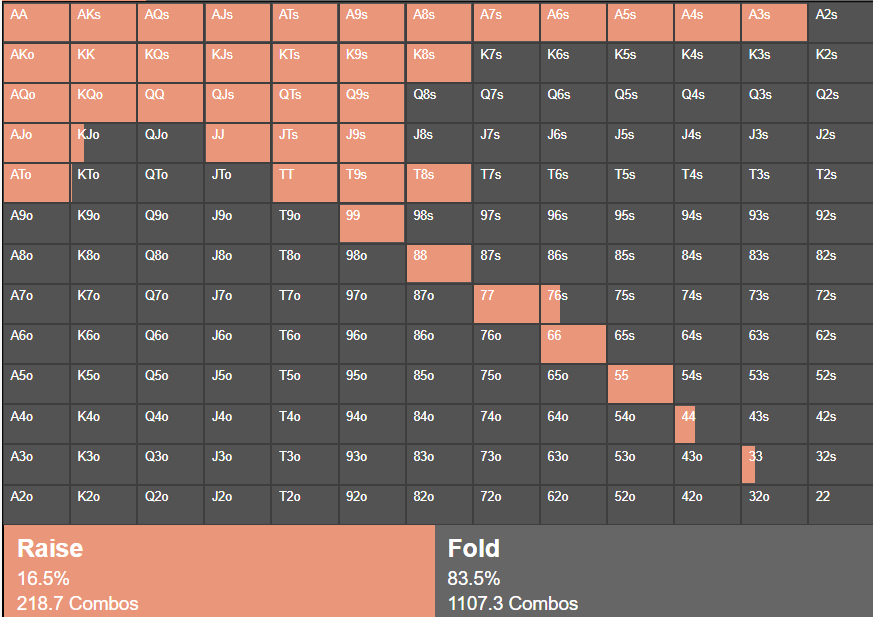
Button Raise With 60 Big Blinds
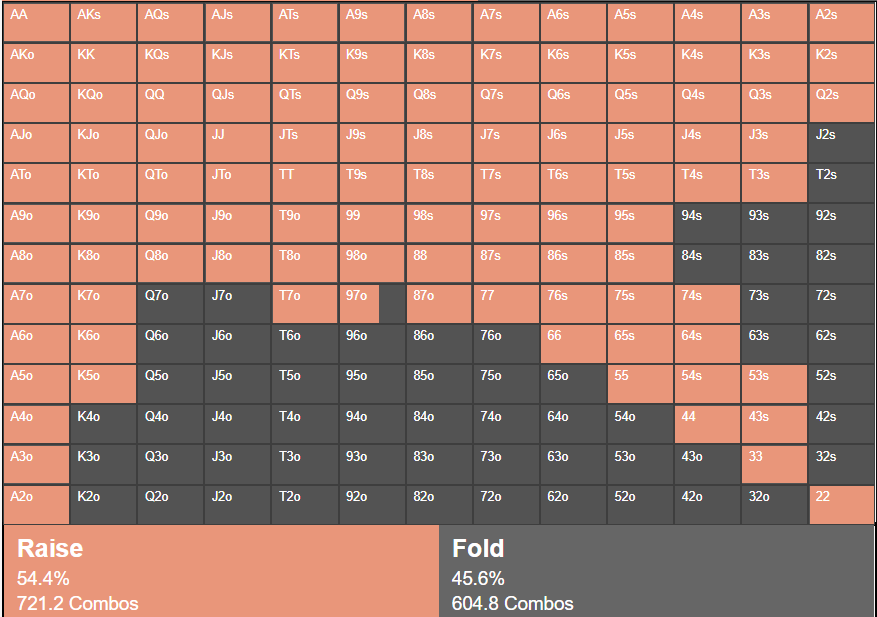
The Best Small Blind Strategy
A lot of poker players make the mistake of playing too many hands from the small blind, they think that just because they were required to put money into the pot, it makes sense that they play more hands since they are already invested. Instead of calling, the small blind is much better off three-betting. By three-betting, the player in the small blind not only decreases the likelihood that the big blind will remain in the hand, but they also get to play post-flop as the preflop aggressor. Due to the positional disadvantage the small blind always has, they are much better off three-betting as opposed to calling preflop to gain as much of an advantage back as possible.
Poker Tip #4: Be Very Aggressive
In order to win at poker, you must be willing to play aggressively. By playing aggressively, you have the opportunity to steal pots and equity from your opponents regardless if you have the best hand.
Let’s say an opponent raises you in the lojack and you have 9♣-8♣ in the small blind.
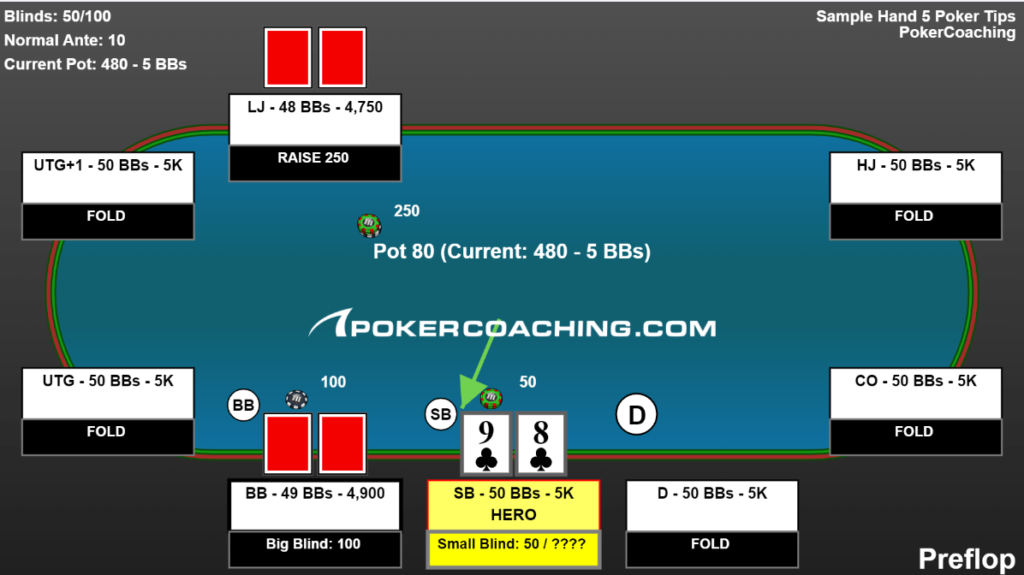
A lot of players will simply call to see the flop, and will check/fold every street postflop when they miss and their opponent bets. However, what if you decided to three-bet preflop as opposed to just call? If your opponent has a weak hand or they are a tight nit, you can force them to fold what could have been the better hand! Even if they call preflop, if you correctly continuation bet on the flop you may still be able to force opponents out of the hand. By three-betting preflop as opposed to just calling, you provide yourself more opportunities to win the hand other than simply having the best hand.
Utilizing Aggression At The Small and Medium Stakes
In low/medium stakes poker tournaments and cash games, it is vitally important that you continuation bet after the flop frequently. A lot of poker players make the mistake of labeling all low-stakes players as calling stations, but most players at these stakes avoid putting money in the pot down to the river if they lack a good hand. Against the right opponent in small stakes games, after three-betting preflop, betting the flop, and then betting the turn, you must be willing to bluff on the river if you think they have a marginal hand. A common mistake amongst small stakes players is that they will bet the flop and turn but check on the river if they lack a good hand. Giving up in these spots results in you torching chips when you could have potentially taken down a nice pot by maintaining your aggression.
Poker Tip #5: Make Sure To Enjoy Yourself
Whether enjoying poker online or live, It is important to remember that poker is a game and we play games to add value and joy to our lives. Do not let the routine swings of the game affect your mental state. Many beginners make the blunder of playing too big of stakes to the point that when they lose, it is not only detrimental to their finances but their emotions. Do not let poker negatively impact your life!
The best way to ensure poker remains enjoyable is by playing within the proper stakes. Just because a game exists does not mean you have to play it! If you only have a $1,000 bankroll and your friend invites you to play a poker game that has a $200 buy-in, you probably shouldn’t play that game! It is not necessary to feel insecure or left out by declining to play in a poker game, if you cannot afford to lose at certain stakes not only will you not play your best, but you will not have fun playing.
When you are just starting out, play the smallest stakes possible whether that be online or live. In order to win at poker, you must play games that you can beat, and that may very well mean playing extremely small stakes if you are just starting out. Microstakes tournaments and cash games offer a great way for new poker players to gain a lot of experience without having to put their wallets on the line.
You only have one life to live, so spend your time playing poker at a level where you can perform at your best and afford to lose.
Conclusion
As Mike Sexton once said, “no-limit Texas Hold’em takes minutes to learn, but a lifetime to master.” The game of poker can certainly seem intimidating when you are just starting out, but if you are willing to spend time studying before sitting at the table, you will give yourself a proper head start over other new players. Remember the final tip from this article: enjoy yourself. Have fun at the table and simply try to play your best, if you remember what’s important, you may very well make some money along the way.

